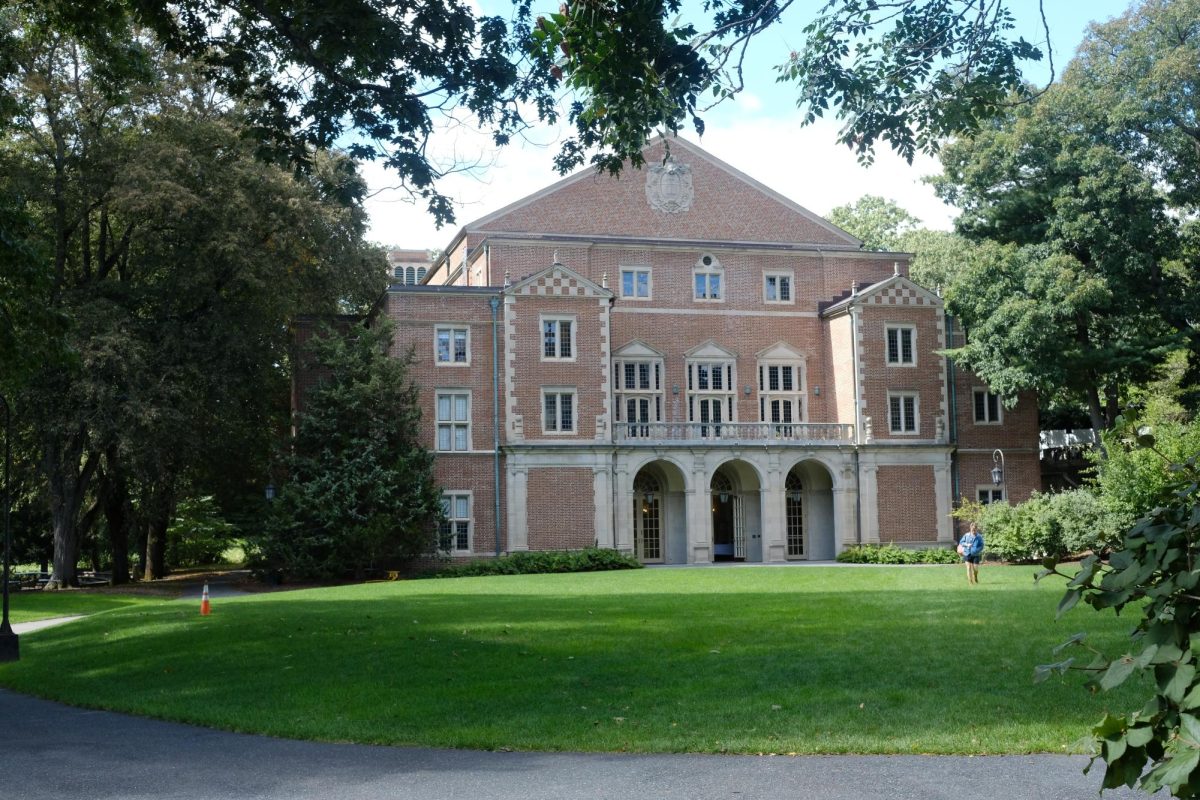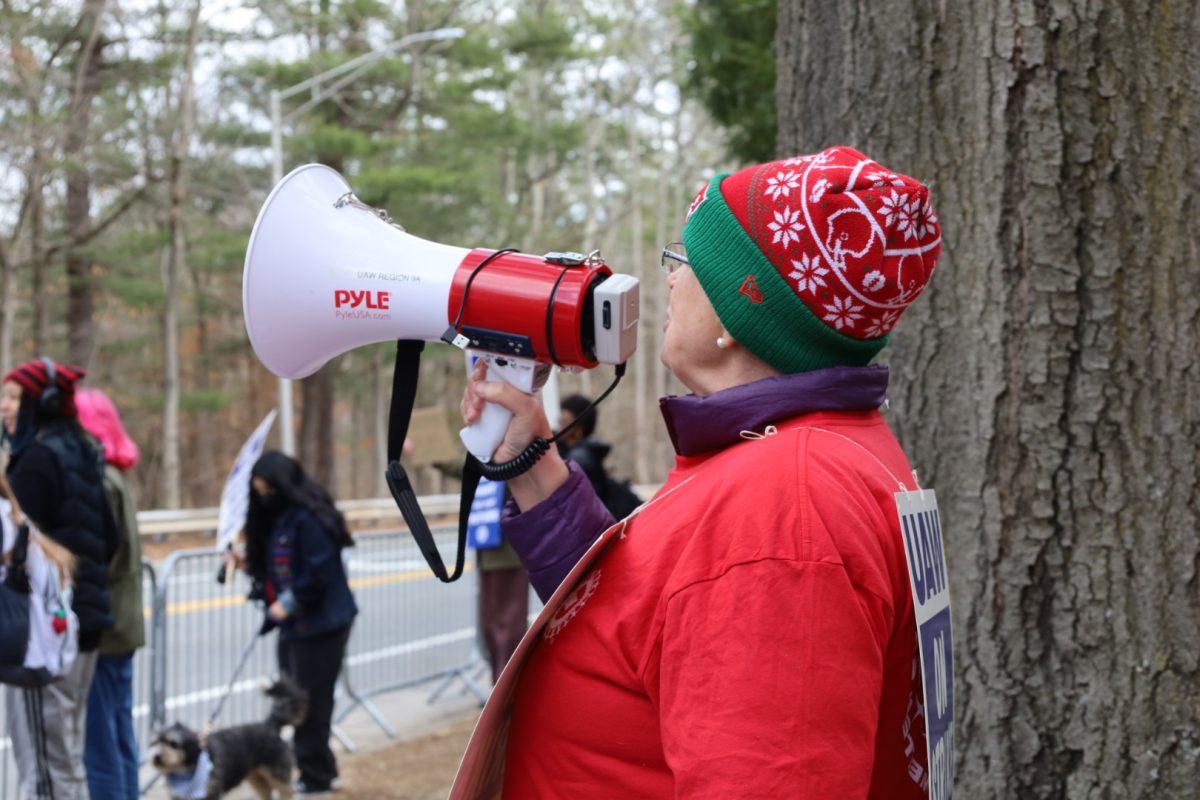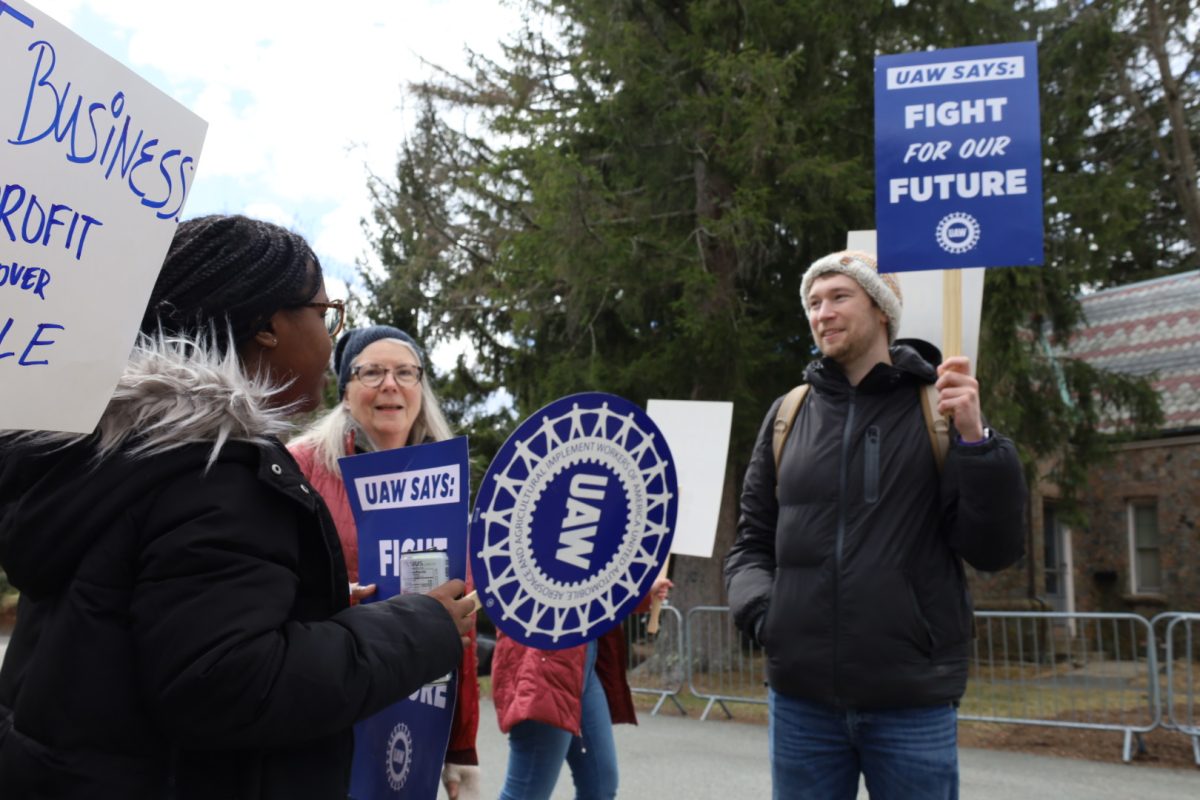One student name in this article is a pseudonym to protect the anonymity of the interviewee who fears retaliation and harassment.
Wellesley Drag, an ensemble of queer and trans students on Wellesley Campus, opens the doors of Shafer basement to the community once a month for a themed show with dancing, music, art fairs and photography. It was first brought to life in March of 2022 by Ayelet Cartolina Kaminer ’25, a Wellesley sib with experience in go-go dancing, nightlife and performance arts.
“I came into the drag scene at Wellesley from the ground of performing in nightlife in New York, and now that’s what I am doing in Berlin,” said Kaminer, who is now studying abroad in Germany for the spring of their junior year. “I started it because I came to Wellesley from a background of when I was in high school, in a pretty similar collective of young, queer people who wanted to make some sort of weird art but didn’t have any institution or support or money,” said Kaminer.
Kaminer notes that a key tenet of the collective is that the group identifies as a non-institutional space. It is not constituted as a campus organization and does not receive funding.
“I really struggled my freshman year … everything was through the college when I wanted something that was independent,” said Kaminer, “There’s a lot of institutional opposition and Wellesley creates opposition [against] doing things without the sort of gold-star stamp of the college or [going] through SBOG.”
For Kaminer, the element that makes Wellesley Drag so important is that it furthers the school’s connection to the native and hedonistic elements of the queer community.
“Often [there are] these stories of queer peoples’ lives of [queer bodies] being m*rdered and t*rtured, and horrible things happening. I like having a connection to queerness that’s rooted in joy and I think, especially at a historically women’s college, it’s really easy to take at face value that everyone’s gender expression is what it looks like,” said Kaminer.
For Kaminer, Wellesley Drag is a place to express yourself, perform the art of gender expression, and have fun.
“What I think is most important is finding a consistent space for trans students to call home. I also think it’s important to have fun on a regular basis. I don’t think that it’s healthy to be so cerebral all the time,” said Kaminer, professing that they too are guilty of focusing on their studies too much at times.
Wellesley Drag acts not only as a space for trans and queer students to be visible through performance, but also offers a creative sphere to visual and material art craft fairs, photographers and DJs. The compensation from tips from a single show usually varies from $11-20 per performer, DJ and photographer. In total, on average, Kaminer tips out 12 individuals for the work they put into the event. All tip transactions occur through the Wellesley Drag Venmo account, rather than personal Venmos or cash, then are divided equally. Kaminer explains the first Wellesley Drag show had only seven attendees, so each performer could have their own Venmo posted, but because Wellesley Drag has grown to a much larger event, they thought it was fair that everyone get paid the same amount. Kaminer decided to opt against cash tips because, with their experience in go-go dancing, they found that some audience members feel entitled to touch performers’ bodies, tease with money, or be generally rude, although they hope this behavior wouldn’t occur on Wellesley’s campus.
“[Opting for Venmo] makes Drag a little less transactional and a little bit more like crowdfunding,” said Kaminer, “The whole production of Drag gets no funding from the College, so all the speakers and tables and random [things] are bought either by performers or by me … it’s really a labor of love. Drag as an artform is very much community rooted. There’s an element of mutual aid that goes into it.”
The costs that go into the production of Wellesley Drag that go beyond paying the performers and staff include the various decorations and the sound system. Wellesley Drag had previously been hosted in Claflin Hall, but when Clapp Library renovations began, Claflin basement transitioned to a study space, dislocating Drag. According to Kaminer, their sound system went missing as well.
“[There have been] so many obstacles,” reflected Kaminer. For Kaminer, the obstacles and the attendance at each event make the need for tipping even more urgent. Kaminer noted that they never expected the collective to become so popular.
“Wellesley Drag has gotten so much bigger than I could have imagined. I think it has expanded beyond the stupid thing I do with my friends over the weekend. Now people come from other colleges and people that don’t go to Wellesley bring their cis/het boyfriends. I think that’s all amazing and so, so unimaginable, but at the same time I don’t want the relationship between audience and performer to be a one-sided one.”
Although tips are sometimes low, Kaminer relayed that Drag has never had an occurrence similar to the weekend of Saturday Feb. 17. Wellesley Drag hosted a Valentine’s Day themed show that evening, which had the routine busy turnout and multiple acts. The morning after the show, when Kaminer checked the Wellesley Drag Venmo account, they saw that the group had only received a single donation of $10. Kaminer called Venmo thinking there might have been an error. Then, Kaminer, alongside other members of the collective and the Wellesley Drag Instagram itself, took to social media to rally up tips and encourage attendees to contribute.
Fellow student and Instagram follower, Wendy ’25, upon seeing the Instagram post, thought the message was too strong.
“After the first drag [show] of the year, there was a post on Instagram from the Wellesley Drag Instagram account that said something along the lines of, ‘We only got $10 in tips last night, open your wallets or drag won’t be happening anymore,’ or, ‘it won’t happen,’” recounted Wendy.
Wendy screenshotted the post and uploaded it to Sidechat, an anonymous social media, with the caption, “With all due respect, tips are not obligatory. Maybe without the sass, I’d be interested in tipping but, try not to demand it.”
Wendy immediately received backlash to their comment.
“[I] got responses like, ‘they work so hard on this, the least you could do is tip them, don’t be so selfish they need this space, this is a fun place to be queer on campus,’” said Wendy, “The responses kind of came a little harshly … the energy was pretty harsh coming from people … it got personal at some points.”
Wendy relayed that she understands the amount of time and energy put into a production like Drag, but thinks that rather than requesting tips, a better solution would be to have a cover fee.
“If [Wellesley Drag] is expecting money for people to watch [their] performances, then [they] should just charge people to enter. That’s what plays do and that’s why I mentioned [in my argument on Sidechat that] Broadway shows and small theaters all take months to plan as you said Drag does, but they charge a fee for you to enter. And they don’t expect tips,” said Wendy.
Although Wellesley Drag is not necessarily against the idea of cover fee or tickets in the future, especially if tipping continues to be low, Kaminer explained that it did not seem feasible in the past.
“Nobody, in this economy, [wants to buy] tickets to go to Shafer basement,” said Kaminer, while laughing, “Drag is rooted in the artform of gender expression, it’s different than going to the opera or to a punk concert … I have had a lot of conversations with performers where they have suggested having a cover fee of some sort, and I don’t think that is necessarily out-of-the-question, but part of the culture at Wellesley is when you go to an [event] and someone has their Venmo up, you Venmo them.”
As a waitress back home, Wendy explains that tipping is a different concept to her. She makes $10 below the minimum wage of her state because her boss knows that tips typically make up the difference. In her line of work, Wendy acknowledges that her customers tip her out of generosity, not obligation, and that the Instagram story posted by Wellesley Drag seemed to put pressure on their audience.
“When you go to a restaurant, you should tip in America because that is how this country works, but you don’t have to. And it’s not expected, it’s kind of needed, but it’s not expected. That is my livelihood, that’s not just me doing a performance on campus for fun, that was me working to support my family,” said Wendy, “I am not going to compare different careers, but it’s a hard job, and I don’t know the details behind preparing a drag performance.”
Wendy admittedly noted that she has never been to a drag show off of campus, and has only been to Wellesley Drag a handful of times, given that she is not interested in the type of performance that Wellesley Drag offers.
“I am not particularly interested in the kind of performance that I think Drag wants to promote. Throughout various discussions I’ve seen on Sidechat and with people on campus, people have described Wellesley Drag as a burlesque show, and based on a Google search on what burlesque means, it sounds pretty accurate, and that’s just not something I’m interested in,” said Wendy. “I’m not interested in watching people in a sexual context … especially when I don’t know them. Drag just isn’t my thing.”
For Wendy, going to Drag is more for social reasons than for the show itself. She explained that her friends frequently attend the performance. Oftentimes for Wendy and her friends, she feels as if there is nothing else to do on campus.
“I think that Drag being the primary space that people are calling the cool place to be gay or the fun place to be gay [is] not ideal. It is somewhat sexual in nature. And I’m going to say somewhat, but a number of the dances are more overtly sexual than others,” said Wendy.
Kaminer admits that the show might not be for everyone, and encourage people who don’t enjoy the performance to find an artistic or social outlet somewhere else on campus. Kaminer explained that they hope that none of the audience members feel coerced to come to the event.
Wendy disclosed that she did not know that tipping is the norm in drag culture.
“I just didn’t have that sort of context [about tipping] and I don’t know how many Wellesley College students have had that context at a drag experience. You can’t expect everyone to know everything about this,” said Wendy, “If there’s something that’s really important to you or an expectation, I feel like you should explain it.”
Typically, at a Wellesley Drag show, the host gives a spiel on tipping, encouraging the audience to tip their performers and explaining why. Wendy, who has gone to five shows, shared how Wellesley Drag normally approaches the subject beforehand, from their perspective.
“At Wellesley Drag, it’s kind of been like, ‘Hey, make sure to tip your performances. We’ve worked so hard, guys. Admin doesn’t support us. We’re doing this on our own. Support us. Give us tips,’” said Wendy. Wendy then went on to explain that for her, having a more personal approach to tipping would put her in a better position to give tips.
“The main thing that we can do to encourage tipping is to create a culture around it,” said Kaminer. For Kaminer, tipping is a normal part of drag culture and they have attempted to communicate this through the shows.
“I think [not having the context of tipping norms] was kind of the crux of why things went so poorly. Just a lack of context throughout,” said Wendy. For Wendy, the biggest hardship throughout the weekend of Feb. 17 was her frustration with the communication.
“As the communication on Sidechat became more toxic than what I saw the original Instagram post to be, my opinions about the performance and maybe the organizers was kind of affirmed – that they’re rude people who are not open to discussion,” said Wendy.
Although it wasn’t made explicit on the original Instagram post, Kaminer added that Wellesley Drag appreciates the support, but does not expect it. Kaminer acknowledges that money can be tight in college and understands why tipping might be difficult.
“[An argument for not tipping would be] if someone in the audience feels entitled to the artistry of queer people or lacks an understanding about the work that goes into it. But also, I have been broke at a drag show and didn’t tip … part of being a grown-up is knowing your limitations,” said Kaminer, “Drag is really something that is sustained by love of the community and the space, and I think that everyone brings what they can to it. Tipping can not be further from the only way you can contribute to Drag, if there are people who read this article who are like, ‘damn, I do not have the funds,’ there are so many ways to volunteer and be a part of it. It’s amazing that there is so much community support.”




